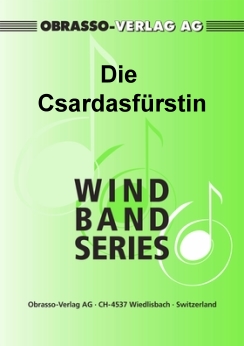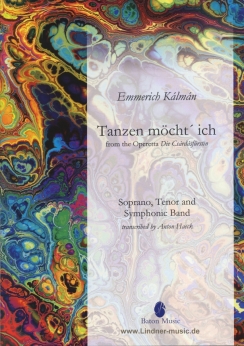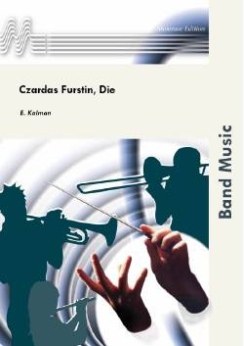Komm, Zigány!, Emmerich Kálmán/Jos van de Braak

| Bestellnummer: | 335393 | |
| Kategorie:: | Blasorchester | |
| Schwierigkeitsgrad: | 3 - Mittelschwer | |
| Dauer: | 07:00 Minuten | |
| *Preis: | 99,00 € | |
| Lieferzeit: | 2 - 4 Tage | Portofrei (Inland) |
| Genre: | Klassische Musik | |
| Solo mit ... | ||
| Gesang |
Komm, Zigány!, Emmerich Kálmán/Jos van de Braak - Blasorchester
from the Operetta Gräfin Mariza
Tenor and Symphonic Band
Emmerich Kálmán (1882-1953) was a contemporary of Bartók and Kodály at the Budapest Academy of Music. He first coupled a career as a music critic with more conventionally serious composition, before, in 1908, turning his attention to the operetta. Gräfin Mariza (Countess Mariza) is one of Kálmán's most popular compositions. It's an operetta in three acts composed in 1924, with a libretto by Julius Brammer and Alfred Grünwald. It was premiered in Vienna on 28 February 1924 at the Theater an der Wien. Gräfin Mariza, exemplifies Kálmán's ability to successfully incorporate Hungarian motifs into the traditional Viennese light opera. The aria Komm, Zigány is sung by Count Tassilo at the very end of the first act. After an introduction full of melancholy the aria is followed by an arousing czárdás.
Emmerich Kálmán (1882-1953) was a contemporary of Bartók and Kodály at the Budapest Academy of Music. He first coupled a career as a music critic with more conventionally serious composition, before, in 1908, turning his attention to the operetta. Gräfin Mariza (Countess Mariza) is one of Kálmán's most popular compositions. It's an operetta in three acts composed in 1924, with a libretto by Julius Brammer and Alfred Grünwald. It was premiered in Vienna on 28 February 1924 at the Theater an der Wien. Gräfin Mariza, exemplifies Kálmán's ability to successfully incorporate Hungarian motifs into the traditional Viennese light opera. The aria Komm, Zigány is sung by Count Tassilo at the very end of the first act. After an introduction full of melancholy the aria is followed by an arousing czárdás.
* Der Notenverkauf unterliegt der Preisbindung. Aus dem Grund können wir kurzfristige Preisanpassungen leider nicht ausschließen. Wir informieren Sie rechtzeitig.





